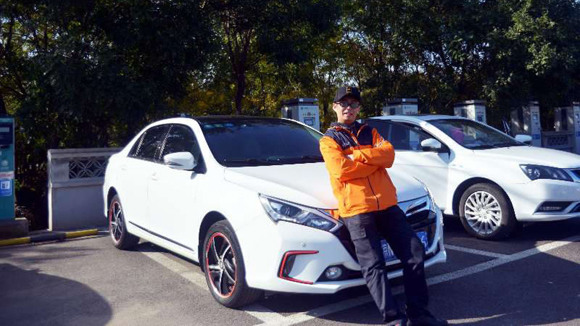
Beijinger Sun Hao has owned his plug-in hybrid electric vehicle for three years. (Photo: CGTN/Sun Hao)
The future of driving, it seems, is electric.
Volvo has announced plans to make all its cars partially or fully battery-powered from 2019, while sales of petrol and diesel cars will be banned in Britain and France from 2040.
In China, the world's largest auto market, 507,000 all-electric vehicles (EVs) and plug-in hybrid electric vehicles (PHEVs) were sold in 2015, a 53 percent increase on 2015.
But while the environmental and money-saving benefits of driving electric cars have been well publicized, the issues with these vehicles are equally high-profile.
The biggest concern for drivers is how far they will be able to travel between charges – and the availability of charging stations.
Following closely behind in the traffic jam of worries about electric cars is their cost compared to regular vehicles. Most models are currently more expensive than their fuel-guzzling equivalents.
Authorities from China to Norway are racing to build enough charging stations to guarantee power and calm what has been dubbed "range anxiety".
Meanwhile, governments are offering subsidies and other perks to encourage people to choose more expensive, greener cars.
In these early days of the electric car revolution, the people already driving them have valuable insights into their pluses and minuses, and their chances of overtaking cars with internal combustion engines in motorists' hearts.
So what do Chinese electric car drivers have to say about their experiences?
"Electricity-driven engines produce so much less noise and vibration. I could never go back to combustion engines," said Sun Hao, a 44-year-old father and businessman in Beijing. He bought his first PHEV from Chinese carmaker BYD three years ago.
Unlike all-electric vehicles such as those made by Tesla, Sun's PHEV has a standard engine which he can switch to in case of low battery.
"A Tesla may be good in the city, but people start to worry about the battery once they go out of town because there are no charging stations on the expressway. It's like an adult toy for rich guys. A middle-class working family needs more stability," he believes.
Difficulties with charging even in the city help convince Sun that PHEVs are currently the only practical choice.
He explained that electric car producers provide a charging pole and the state grid will install it for free, but most Beijing residents don't have a fixed parking place at home.
Sun has to stretch a 25-meter cable out of the window of his apartment to charge his car. Parking spots are so hard to find in Chinese cities that drivers are usually forced to leave their cars by the roadside. That's no good for charging.
Consumer review website is full of charging horror stories.
"Many parking lots in Shanghai are lax with management. Non-electric cars are allowed to occupy the parking places reserved for electric cars. It's a huge waste of resources. What's more, as the charging stations are placed inside parking lots, you face parking fees in addition to electricity fees," complained a reviewer with the screen name "Xiaoxiaozhi".
Nevertheless, the government's preferential treatment for electric car drivers makes these vehicles attractive to many.
According to "Sohoha" , government subsidies shaved 83,250 yuan (12,491 US dollars) off the 209,800-yuan price of the newest BYD model in 2014.
And they offer a good way around the bureaucratic hurdles to driving in China. The lottery system big Chinese cities use to dole out license plates keeps many would-be motorists off the roads. Electric cars are exempt from this system.
Nissan Leaf owner "Linshiguashi" said, "It's hopeless to try your luck with the Beijing plate lottery. I tried for four years before I lost patience and turned to a new energy car."
And the benefits don't stop once you have your car and are cleared to drive.
"Linshiguashi" marveled that electric cars can be driven seven days a week in Beijing, where other cars are barred from the roads on alternate days, according to their plate number.
"However, the policy is under savage attack from non-electric car owners. I predict this perk may be revoked soon," warned "Linshiguashi".
This is a perfect example of how, in China at least, there are many questions for governments and carmakers to answer before we can all be expected to go electric.


















































